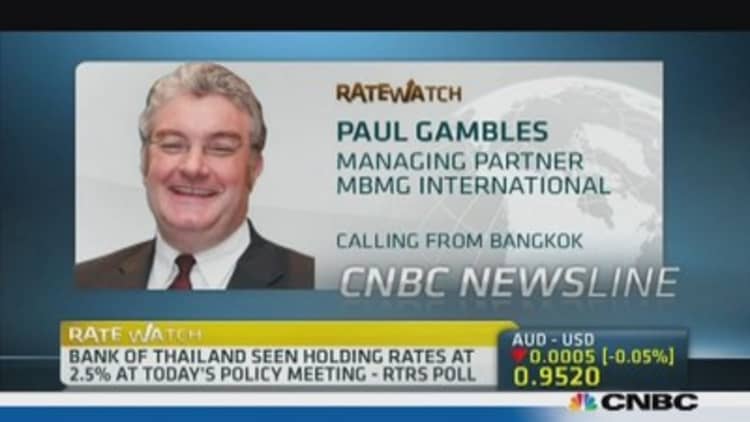Thailand plans to tap the capital markets for as much as $15 billion in its biggest international round of debt sales for a decade.
The issuance will mark an important test of investor appetite for emerging Asian economies, which are seen by many as vulnerable to a gradual tapering of the U.S. Federal Reserve's emergency asset-buying program.
Kittiratt Na-Ranong, Thai finance minister, said the country was looking to raise between $10 billion and $15 billion over the next seven years – or at least $1.5 billion every year – for a 2 trillion baht infrastructure program.
(Read more: With debt deal done, are emerging markets set to soar?)
"Even though the majority of the money will be raised locally because we have ample liquidity in the country, we believe it's right to open up for some U.S. dollar bonds," Mr Kittiratt told the Financial Times in an interview.

Thailand last tapped the international bond market in 2006 when it raised $200 million, according to data from Bloomberg. Regis Chatellier, a senior emerging markets credit strategist at Société Générale, reckoned that the government could now be looking at paying between 4 to 4.15 percent for a 10-year issue.
(Read more: Left to languish, fire trucks present a reminder of Thaidysfunction)
While Thailand's debt management office said last month that the country could be looking to raise up to $1.5 billion in debt markets next year, the minister's comments are the first clear indication of the bigger size and long-term scope of the dollar debt plan.
Although Thailand is not seen as one of the most at risk emerging Asian economies, the debt plans come amid a worsening outlook for southeast Asia's second-largest economy.
On Monday, the central bank cut its GDP growth forecast for the country for this year to 3.7 percent. This compares to its previous estimate of 4.2 percent and is the fourth downward revision this year. Exports fell 2.9 percent last month year-on-year, the sixth straight month of decline, according to official figures also published on Monday.
(Read more: Thailand:the old man of Southeast Asia)
One Bangkok-based analyst said the government seemed to be seeking alternative sources of funding as insurance against local cash becoming less readily available, as the current account fell into deficit and demands grew for multibillion-dollar subsidies to rice farmers.
"They want to keep their options open, just in case domestic interest rates go up quickly and they run into liquidity problems," the analyst said.
While there is broad agreement in Thailand about the need to improve the country's stretched infrastructure, the government's proposals have been attacked by the opposition Democrats and some independent analysts. A proposed high-speed rail link is proving divisive, while some observers say the infrastructure plans as a whole lack details and should have more parliamentary oversight.
More from the Financial Times:
EM bonds in better shape after sell-off
Thai bank chief warns on subsidy largesse
Indian stocks close in on three-year high
"A sovereign issue would certainly warrant a look as the bulk of Thai dollar debt at the moment represents state-owned utilities and a handful of financials," said Robert Abad, emerging markets fund manager at Western Asset Management.
But he added: "The Thai infrastructure program, while constructive on paper as a means of boosting growth activity, raises a number of issues that are specifically pertinent to emerging markets – these include, but are not limited to: transparency around the sources and uses of funds, efficient resource allocation and timely execution, corruption-related legal risks and the potential for accounting distortions at the public and private sector levels.
Mr Kittiratt, for his part, dismissed concerns that Thailand's ambitious infrastructure spending program could go the way of China's massive 2008 stimulus – which has been dogged by corruption and inefficiencies.
(Read more: Credit squeeze in Asia now worst since financial crisis)
"In our infrastructure investment, each project, before it gets a green light to move ahead, will have to pass the careful consideration of the National Economics Social Development Board, it will have to pass the Budget Bureau, it has to pass the minister of finance and it has to pass other bureaus as required by law," he said.
"This proposed bill is not a blank cheque to allow the government or the future government to do anything they can."

